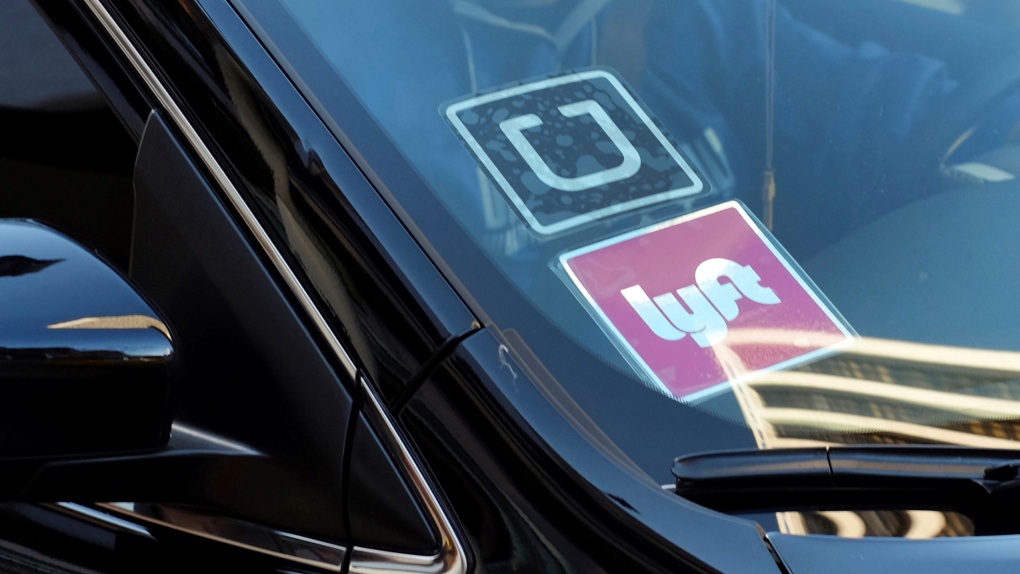'Is it worth your life?': Women working for apps like Uber don't feel safe reporting harassment
 In this Jan. 12, 2016, file photo, a ride share car displays Lyft and Uber stickers on its front windshield in downtown Los Angeles. (AP / Richard Vogel)
In this Jan. 12, 2016, file photo, a ride share car displays Lyft and Uber stickers on its front windshield in downtown Los Angeles. (AP / Richard Vogel)
Uber, Lyft, DoorDash and other similar apps are failing to support women gig workers, a University of British Columbia study suggests.
According to the study, gig-industry platforms like these put women at financial and personal risk.
Gig-industry jobs are often freelance, and connect workers with customers through an online platform or app.
Researchers interviewed 20 female gig workers from both the U.S. and Canada and found that women said they usually have to “brush off” sexual harassment due to the lack of resources and fear of job loss.
“Is it worth your life to speak up right now? And most of the time, it’s not, so you just don’t,” one female driver said as to why she doesn’t feel safe speaking up.
The study's lead author explained this type of response was common.
“The platforms have no clear policies to support women drivers to set clear boundaries when interacting with riders: when is it okay to kick someone out of the car without being penalized by a low rating from that rider?” said Ning Ma in a news release.
According to research by marketing and consumer data website Statista in 2019, 45 percent of female respondents said they have worked in the gig economy in Canada, which is three per cent higher than male respondents.
Perhaps because of this, some apps have made efforts to account for the safety of their female drivers.
On many of these apps, female drivers can click on a safety button that dials 911. Ma believes this is not always helpful.
She said the majority of the harassment incidents were verbal and didn’t require 911. In other words, calling 911 wastes time for these female gig workers who are trying to earn money, Ma explained in the release.
The study suggests that “brushing off” harassment was a de-escalation technique for some women.
“I had a guy refuse to exit my vehicle unless I kissed him...I delayed and defect(ed). I was dropping him of at another bar so I told him that after I was done with my shift I’d meet up with him and he agreed to that. Of course I never went back. But he agreed to that so he exited the vehicle and I was able to leave,” said one driver interviewed for the study.
Another factor for “brushing off” harassment was the fear of losing their jobs by getting lower ratings.
WHAT NEEDS TO BE DONE?
To prevent or decrease incidents of harassment, Ma said, these apps could match female drivers with female passengers, especially during the nighttime.
The study recommends that these platforms have clear guidelines about how workers should manage interactions with customers and when they should stop providing service. In addition, platforms could allow drivers to give context for negative ratings.
“These platforms are a new form of workplace, and they need to start viewing gig workers as ‘workers’ and invest in their safety and comfort,” said Ma.
CTVNews.ca Top Stories

Aviation experts say Russia's air defence fire likely caused Azerbaijan plane crash as nation mourns
Aviation experts said Thursday that Russian air defence fire was likely responsible for the Azerbaijani plane crash the day before that killed 38 people and left all 29 survivors injured.
Police identify victim of Christmas Day homicide in Hintonburg, charge suspect
The Ottawa Police Service says the victim who had been killed on Christmas Day in Hintonburg has been identified.
Teen actor Hudson Meek, who appeared in 'Baby Driver,' dies after falling from moving vehicle
Hudson Meek, the 16-year-old actor who appeared in 'Baby Driver,' died last week after falling from a moving vehicle in Vestavia Hills, Alabama, according to CNN affiliate WVTM.
Pizza deliverer in Florida charged with stabbing pregnant woman at motel after tip dispute
A pizza deliverer in central Florida has been charged with pushing her way into a motel room with an accomplice and stabbing a pregnant woman after a dispute over a tip, authorities said.
Raised in Sask. after his family fled Hungary, this man spent decades spying on communists for the RCMP
As a Communist Party member in Calgary in the early 1940s, Frank Hadesbeck performed clerical work at the party office, printed leaflets and sold books.
Cat food that caused bird-flu death of Oregon pet was distributed in B.C.: officials
Pet food contaminated with bird flu – which killed a house cat in Oregon – was distributed and sold in British Columbia, according to officials south of the border.
Unwanted gift card in your stocking? Don't let it go to waste
Gift cards can be a quick and easy present for those who don't know what to buy and offer the recipient a chance to pick out something nice for themselves, but sometimes they can still miss the mark.
India alleges widespread trafficking of international students through Canada to U.S.
Indian law enforcement agencies say they are investigating alleged links between dozens of colleges in Canada and two 'entities' in Mumbai accused of illegally ferrying students across the Canada-United States border.
2 minors, 2 adults critically injured in south Calgary crash; incident was preceded by a robbery
Multiple people were rushed to hospital, including two minors, in the aftermath of a serious vehicle collision on Thursday morning.
































